



 By Eugene Davis
By Eugene Davis
By Eugene Davis
By Eugene Davis
By Eugene Davis
By Eugene Davis





 By Eugene Davis
By Eugene Davis
By Eugene Davis
By Eugene Davis
By Eugene Davis
By Eugene Davis

 By Benson Afful
By Benson Afful
The Ghana Revenue Authority (GRA) has begun enforcement of VAT compliance at stone and sand quarry sites across the country with the aim of shoring up revenue to meet the Authori ty’s GH¢80.3 billion tax target for the year.
The authority says the ongoing activity forms part of series of enforcement to be done before the end of the year, as major emphasis will move to the hospi tality sector in the festive season.
In a compliance exercise that started this week, three Chinese rms, Top Stone Quarry, Uniaf rika and Massaike & Sabbagh
Company Ltd located at the Shai Osudoku District Assembly, were clamped down for various infrac tions including non-issuance and selective issuance of VAT receipts.
Area Enforcement Manager of Accra Central, GRA, Mr Joseph Annang, who led the exercise, said the visit to the sites are a continuation of what was begun in September this year.

“Compliance really improved when we started in September and that has been evident in our collection. This latest exercise which puts focus on quarries across the country, is an integral part of the national economy. We
have moved our focus from com merce to the quarry sector. Our test purchases have indicated that most operators at quarries do not issue the VAT invoice” he said.
Key items intercepted in these sites were idle VAT invoices, way bills, company invoices, computer system units, laptops and compa ny documents.
The GRA indicated that these items would assist in carrying out full scale investigations to ascer tain the amount and extent of revenue loss.
Meanwhile, Ag. Head of Opera tions at the GRA, Mr Kwesi Eghan debunked the notion that the Authority has relaxed in its quest to ensure compliance.
He said enforcement through invigilation and mystery shopping or test purchases are key strategies of the Authority which cannot be relegated to the background.
“These are compliance tools for revenue collection. Since Septem ber, we have invigilated about 175 taxpayers. Taxpayers are our stakeholders and we operate with them on the premise of trust” he said.

Mr Eghan however, reiterated the Authority’s resolve to enforce compliance in the hospitality sector during the festive season.
“These are plans to meet our target and to deepen the country’s growth prospect towards revenue mobilization,” he added.
Continued from page 2
The Spokesperson for the Major ity Members of Parliament (MPs) calling for the sacking of Finance Minister, [Ken Ofori-Atta], Andy Kwame Appiah-Kubi says they have ful lled their part of the bargain and expect the Presi dent [Nana Akufo-Addo] to act.
“We expect the President to respect a roadmap to address our request and that means that when we get to the end of it, the president will also perform what we asked him to do.
The Majority MPs last month made a request to the president and having meeting him, and
other executive of the New Patri otic Party, they decided to call o their boycott of the 2023 Budget statement, however after the presentation of the budget last week, they maintain their stance has not changed and await the president on his part of the bargain.
“We made a request to him and he said, wait till we nish the budget, thereafter I will see to your request, so we him to accede to our request.”
He indicated that they expect Mr.Ofori-Atta to be “disengaged after appropriation”.
The MPs last month however, called o the demands until an ongoing negotiation with the International Monetary Fund (IMF) for support to the country’s economy is complet ed.
The MPs from the ruling New Patri otic Party (NPP) said in a statement on Wednesday October 26, 2022 that President Akufo-Addo told them “their demands would be acted upon” after the upcoming 2023 budget reading and naliza tion of IMF negotiations.
The MPs said their demand is to restore hope in the nancial sector
and reverse the downward trend of the economy.
Ofori-Atta had earlier rejected any possibility of going back to the IMF after hurriedly ending an ongoing programme signed onto by the previous government in 2015.
But the country’s economy has been in bad shape. Public debt has been rising beyond sustainable levels. The debt as at March 2022, had exceeded 80 per cent, accord ing to the Bank of Ghana. The public debt has increased to 80.1 per cent of GDP.
AirtelTigo, MTN and Vodafone will start the deactivation of some category of SIM cards from close of day, November 30, 2022, in compliance with the Ministry of Communica tions and Digitalisation’s direc tive issued on November 11, 2022.

A statement from the Ghana Chamber of Telecommunica tions said since Sunday, November 20, 2022, its mem bers had been blocking data services for all subscribers who had only completed stage one (linkage to Ghana Card) but not stage two (biometric capture) of the SIM registration process,

as directed by the ministry. It said the category of subscrib ers to be blocked from Novem ber 30, 2022 would include voice, data (Mobile Phones, Mi s, other data providing devices), SMS (incoming and outgoing) and USSD.
Also, SIM cards on mobile money services and emergency services would also be blocked once the owners had not com pleted both stages of the regis tration process.
“The chamber wishes to once again encourage all subscribers who have acquired Ghana cards but are yet to complete stage two to do so without delay. Our
members are obliged by the direc tive to completely deactivate all subscriber SIMs which have not completed the biometric capture registration by close of business today, November 30, 2022,” the Ghana Telecom Chamber said. The statement entreated custom ers of the networks to avoid being barred from using voice, data, USSD, mobile money services and access to emergency services among others by completing the registration process.
“Our members remain committed to supporting the e orts of all stakeholders to ensure that every customer in every part of the country is able to register their SIM
card(s) with the Ghana card. We urge all subscribers to note that all network services for those who have done only the rst stage registration will be deactivated by close of business today, 30th of November 2022,” the statement said.
The Minister of Food and Agri culture, Dr.Owusu Afriyie Akoto has told parliament that government’s resolve to ensure a sustainable transformation of Ghana’s agriculture is on course and will stop at nothing to attain that, ahead of the National Farmers’ Day.
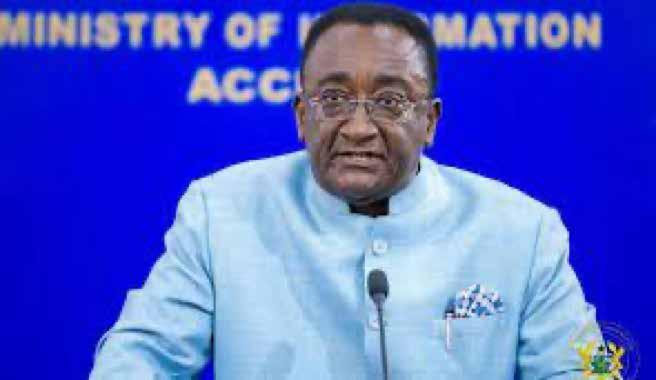
The theme for this year's National Farmers Day celebra tion is "Accelerating Agricultur al Development Through Value Addition". The theme aligns with government's vision of modernizing and transforming agriculture, relevant objectives of the President's Coordinated Programme of Socio-economic Development Policies, and the Sustainable Development Goals, especially Goals one(1) and two (2) which advocate the eradication of extreme Poverty in all forms and Zero Hunger respectively.
According to him, this year's National Farmers' Day, the 38th edition, falls on Friday, 2nd December, 2022, with prepara tions feverishly underway to ensure a memorable and successful occasion following the o cial launch of the cele-
bration on Friday 16th Septem ber, 2022.
“The theme highlights govern ment's recognition and commit ment to the sustainable devel opment and transformation of Ghana's agriculture as well as signify government's apprecia tion of the need to fully harness the potential of our agricul ture.”he said.
The strategic intervention and the success of the Planting for Food and Jobs(PFI) campaign, the minister said demonstrates clearly to government's relent less e orts of systematically addressing the long- standing problems of Ghana's agricul ture.
“Since 2017, massive invest ments have been made by government in the various subsectors of agriculture result ing in signi cant achievements. Notable impacts are visible in the food crops subsector, where farmers continue to bene t from subsidized inputs programme and millions of seedlings of six selected tree crops distributed free of charge to farmers throughout the coun-
try as part of the diversi cation agenda of the Government.”
The Horticultural subsector, now has three new Greenhouse centres located at Dawhenya, Bodwiase and Akomadan in the Greater Accra, Central and Ashanti Regions respectively. Others include, the construction and rehabilitation of major irrigation schemes, feeder roads and 80(1000mt tons capacity) ware houses constructed throughout the country, he noted.
“The positive outcomes of these activities are re ected in the macro economic statistics. In 2019 the agriculture sector grew by 4.7% followed by 7.4% in 2020 and a record 8.4% in 2021. With the excellent rains this year we expect the substantial growth perfor mance of recent years to be repeat ed this year 2022. The strong growth in recent years have increased the share of agriculture sector in Ghana's GDP from 18% in 2016 to 22% by 2021. These impres sive results were posted by the sector against all odds, when mul tiple external shocks and unfa vourable external global condi tions had impacted virtually every economy including Ghana. Supply chains had been badly disrupted
resulting in acute shortage in criti cal inputs like fertilizers, the Animal sector which had been badly hit by diseases such as swine u and the Highly Patho genic Avian In uenza, while farm lands were also being destroyed by galamsey activities.
We in government recognize that the impressive performance of the agricultural sector is largely due to sacri ces and the tireless e orts of our heroic farmers. As a people, the least we can do there fore is to continue to celebrate and reward our farmers with rising farm productivity and incomes.”
Dr.Akoto added that it was his expectation that Members of Parliament will be visible and prominent in the celebration, through their active support and appreciation for the country’s farmers. “This is essential given our shared and collective respon sibility to develop our country with agriculture as the main driv ing force. I have no doubt that I can count on your full participa tion at the 38 National Farmers Day celebration, to ensure a be t ting honour of our farmers.”
Committee, Kwame Governs Agbodza has urged government to remove the capping on Road Fund in the 2023 budget and rather use part of the monies earmarked for the road sector to defray the indebtedness of road contractors.
Toll charges on public roads were removed as part of supportive policy measures under the 2022 Budget State ment and Economic Policy of Government. The scal policy measures to underpin the 2023 Budget for consideration and approval by Parliament include reintroduction of tolls on select ed public roads and highways, with a renewed focus on leverag-
ing technology in the collection to
terized by the previous toll collec tion regime.
The government explained at the time it cancelled the road toll was that it meant to enhance produc tivity and reduce environmental pollution, as well as reduce the heavy tra c that road tolls are found to cause nationwide.
But the nance minister in presenting the budget last week, announced the return of the road toll as part of government’s reve nue measures on selected roads in the 2023 budget.
Contributing to the budget debate on Wednesday, on the oor of the House, the ranking on Roads and Transport, whilst welcoming the
development, said the govern ment was populist in cancelling the toll in the rst place.
According to Hon.Agbodza, “there was no reason to cancel the road toll they did it out of populist and propaganda, because even if the accrual was small, we are a country that even GHc72m, could do something. We were against that and now that they have decided to bring it back in the budget, we welcome that and we have a bigger concern.”
Further he said “if you check the 2023 budget the road fund alone will generate about GHc2.5bn but out of that only 1bn will be given to the roads ministry to do road projects, I believe that when Ghanaians pay money to the road fund, they expect all that monies to do road, when you check the same budget, GET FUND will generate GHc4.6bn, they will give only about GHc1.9bn to GETFUND, the NHIS will generate GHc4.6bn, they will give them GHc2.5bn
But for this idea of capping, so you want money for something but you won’t tell the truth, but you will take the money and do something else, for us to be able to convince ourselves that we are
representing our people and support the reintroduction of the road fund, we expect that the capping on the road fund must be removed because as we speak the ministry of roads owes contractors almost GHc12bn , so if we contribute money, it is not even enough, let’s use the entire 2.5bn to defray the indebtedness” he told Business24 in an inter view.” he told Business24 in an interview.
On the issue of the motorway, he called on government to involve more locals in road contraction rather than giving them subcontracts.
“they have admitted that the so called contract with Mota Angels is null and void, they are thinking of coming up with another strategy and I will keep insisting that the strategy must include local participation, don’t make Ghanaian contrac tors appendages, that a foreign er will come and win the job and sub contract to a local contractors.
The Ofankor to Nsawam stretch is a local contractor, if they are able to do that, they will get our support.”


th end of September 2022 out of the total amount retrieved GH¢11.14 million were directly brecovery into the Consolidated Fund while GH¢16.41 million were indirectly recovery to other institutions.
at various courts. T
To increase awareness and educate the public, the O ce carried out 55 sensitisation programmes on cybercrimes, and an additional 55 sensitisation programmes on gaming.
organisation was committed to improve on its recovery rate and retrieve more funds for the state.
The Economic and Organised Crime O ce (EOCO), has retrieved GH¢27.55 million from proceeds of crime for the state in a period of ten months.
The recovered amount is almost double of monies recovered between 2019 and 2021. This was contained in the budget statement read on the oor of Parliament last Thursday November 24,2022 in Accra.
Finance Minister, Ken Ofori-Atta reading the statement said as at
The development is a record high for EOCO which had in the past been recovering an average GH¢5 million for the country for almost the same period.
According to o cial gures avail able, EOCO in 2019 recovered GH¢4,301,262.79, GH¢4,365,129.69 in 2020, and GH¢6,142,984.01 in 2021.
EOCO, between December 2011 and September 2022 also investi gated 490 cases.
Out of the total investigated cases, the O ce has secured a court conviction, while ve cases had been dismissed and 19 casee were currently under under trail
It also embarked on three outreach programmes on human tra cking and irregular migra tion.
In the budget statement, the House heard that EOCO in 2023 anticipates investigating 450 cases, out of which over 50 cases would be prosecuted. On publica education and awareness creation, the O ce intends to carry out 60 sensitisation programmes on cybercrimes, 55 on gaming, and ve outreaches.
On the development, the Execu tive Director of EOCO, Command er of Police (COP) Maame Yaa Tiwaa Addo-Danquah, said her
In the coming years, she said was positive the O ce would retrieved twice the amount recovered and reported in the 2021 budget statement.
She commended the manage ment team and all o cers of EOCO who continue to work hard with dedication.
Since assuming o ce COP Addo-Danquah and her manage ment team have intensi ed the collaborative work with other state agencies to ght orgainsed crime.
This has been seen in the increased courtesy calls on heads of sister institutions and closed door discussions between leader ship of EOCO and such organisa tions.
ary of the No.2 worldwide producers of Wines and Spirits, in collaboration with Street Sense Organisation, has organ ised the second edition of its road safety campaign dubbed ‘Metwi a, Mentwa’ to sensitize drivers on the need to avoid driv ing under the in uence of alco hol.
The ‘Metwi a, Mentwa’ campaign launch in December last year, aims at promoting responsible behaviour among high-risk com
Nsawam
Speaking at the second edition, Sustainability and Responsibility Manager for Pernod Ricard Ghana, Eunice Osei-Tutu, said the campaign seeks to strategically keep afresh the knowledge and education on drink-driving in the minds of commercial drivers ahead of the festive season in December.
ment Goals (SDGs), in this instance SDG Goal 3 – Ensure healthy lives and promote well-being for all ages. The ‘Metwi a Mentwa’ programme falls within the fourth pillar of our roadmap ‘Responsible Host ing’ which is to ensure that we ght alcohol misuse in society by taking action on harmful drink ing and that our brands are enjoyed responsibly,” Ms. Osei Tutu added.
For her part, Mrs Gloria Laryea, a Member of Trustees of Board for Street Sense Organisation, said the event also formed part of their annual education and awareness creation during and after festivities.
She said: “We all know that during festivities, drivers rush to their destinations and return for more passengers, causing so much havoc in terms of road
taking and alcohol abuse are mostly the root causes of carnages on our road, she said and appealed to the drivers to adhere to road tra c rules and regulations to save more lives.”
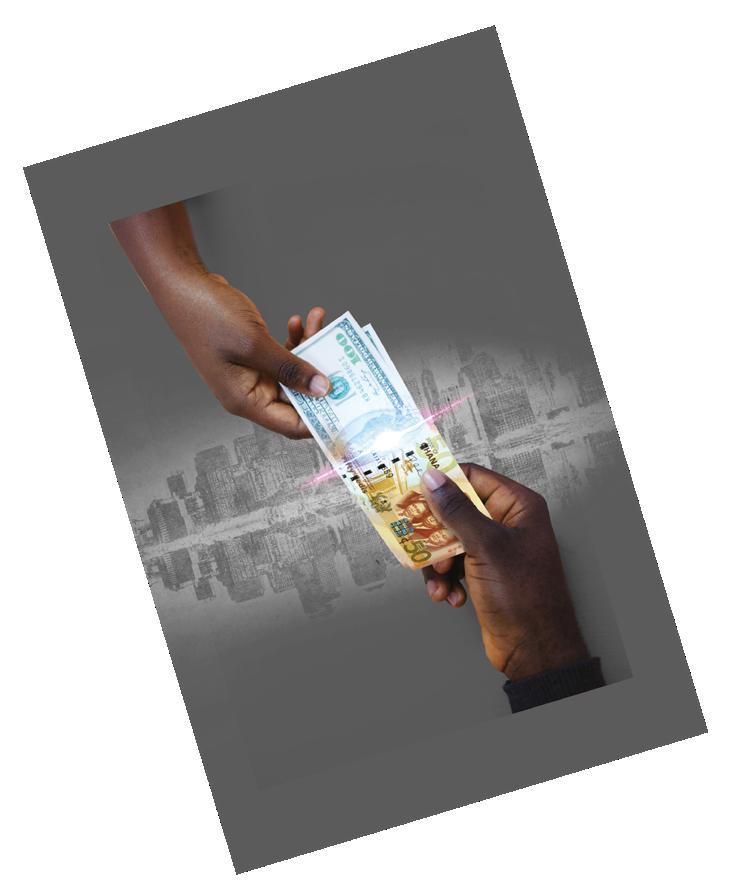

Mrs Laryea said this year, the records had shown a decrease in road accidents and urged the drivers to work hard to sustain the success chalked.
The sensitization e orts coupled with the distribution of campaign logo-branded re ec tive jackets and campaign logo stickers and other souvenirs are expected to serve as reminders to both drivers and other road users on the need to be respon sible on the road to prevent casualties during the festive season and beyond. This will be followed by a digital campaign to reach more drivers during the festive season.
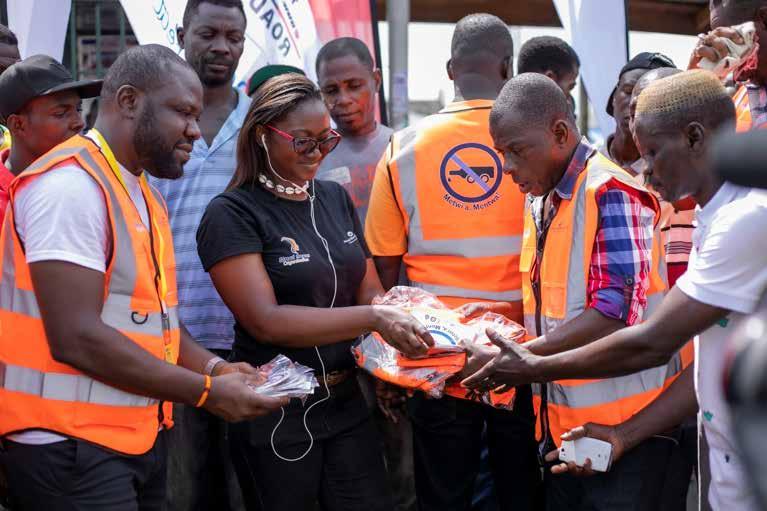
signi cant part of our national GDP coming from the sector. Thus, improvement in the sector is critical for economic sustain ability. In a year when our nation al forex situation is dire, enhanced agriculture viability seems the way forward to earn more,” he said.
He added that “By helping to add value to the agric production process, a lot of opportunities would be created for economic growth. It is for this reason that for the past 15 years, Stanbic Bank has been part of this national cele bration of excellence in agricul ture. Ghana is our home and we drive her growth with innovative and best in class solutions and what better way to do this than helping turn the agriculture sector into a bigger cash cow for the country”.
the 38th edition, will be held on Friday December 2, 2022 at the Jubilee Park in Koforidua on the theme “Accelerating Agricul ture Development through Value Addition”.
supporting the development of Ghana’s agricultural sector, has handed over a Massey Ferguson MF 375 tractor to the Ministry of Food and Agriculture (MoFA). It is to support this year’s National Farmer’s Day celebration, which comes o on December 2 in the Eastern Regional capital of Koforidua. The tractor, which will be presented to the Second

Runner-Up is a continuation of Stanbic Bank’s commitment to the National Farmer’s Day for the past 15 years.
Speaking at a handing over cere mony in Koforidua, Kojo Larbi, Manager for Communications at Stanbic Bank Ghana, said Ghana’s agriculture sector holds the key in improving the country’s econo my. “Ghana’s economy is largely dependent on agriculture with a
The tractor was received by the Minister for Food and Agriculture, Dr. Owusu Afriyie Akoto. The National Farmers Day is com memorated each year to honour Ghana’s Farmers and Fisherfolk for their labour and tireless com mitment to feeding the nation’s ever-growing population as well as contributing to Ghana’s foreign exchange earnings. The climax of this year’s celebration, which is
Over the past 15 years, Stanbic Bank Ghana, through its agricul tural proposition, has been working to improve the agricul ture sector across selected agribusiness value chains. With a deep understanding of the agribusiness value chain, the bank’s knowledge-based approach is aided by the deployment of smart digital solutions to scale up the sector. Beyond this, the bank also leverages on the over 150 years’ experience of the Standard Bank Group, its parent organi zation, in agriculture funding to assist in the rollout of enhanced agriculture services.
The bank also has support systems that augment the work of private extension in agricul ture enterprise development.
Stanbic Bank Ghana, through its agriculture proposition, regards itself not only as a nancier but also as an integral contributor to the development and trans formation of the agricultural sector.
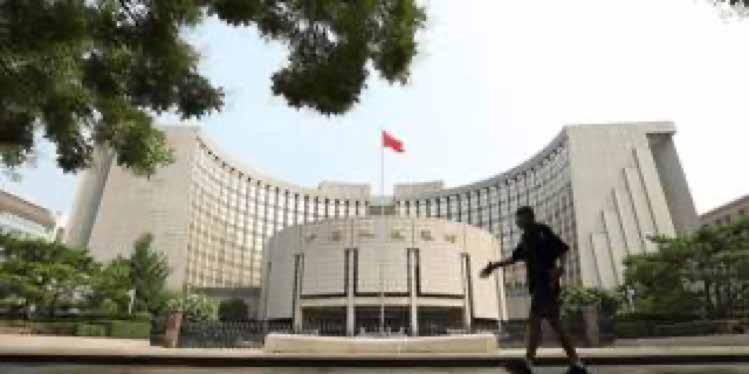
In 2020, Sebastian Mallaby of the Council on Foreign Relations announced the beginning of the “age of magic money,” in which advanced economies would “rede ne the outer limits of their monetary and scal power.” By July 2022, Mallaby was predicting that this age was coming to an end. But, while most major central banks are now reversing quantitative easing (QE) and raising interest rates, China may need to head in the opposite direction.
Observers often forget that QE was invented by the Bank of Japan in 2001 as a tool for dealing with balance-sheet de ation.
Other tools included a zero inter est rate and forward policy guid ance. The BOJ’s balance sheet expanded from 20% of GDP in 2001 to 30% by 2006, fueled mostly by purchases of Japanese government securities.
Yet, as Nomura economist Rich ard Koo observed in 2010, loose monetary and scal policy did not spur rms and households to invest or spend, because they remained focused on rebuilding their own damaged balance sheets. So, in 2015, the BOJ, led by Governor Haruhiko Kuroda, intro duced so-called quantitative and qualitative easing (QQE).
Like QE, QQE aims to produce a
decline in long-term interest rates through massive purchases of government bonds. But policy makers had a second goal in mind: to change Japan’s entrenched de ationary mindset. In 2016, a negative interest rate was intro duced, in order to allow for further monetary easing.
Annual in ation never quite reached the BOJ’s target of 2%, and Japanese economic growth has averaged less than 1% per year for nearly three decades. What the BOJ did achieve was a comprehen sive national balance sheet trans formation, with far-reaching impli cations for Japan’s scal and nan cial systems.
With a rapidly aging population, Japan has a very high savings rate, as people prepare for retirement. When most pension assets in Japan are held in government bonds that earn near-zero interest, de ation poses a risk to the Japanese nancial system. At the same time, if in ation increases and bond yields rise, the pension funds could face very large losses.
QQE has changed everything. By buying government bonds from the pension funds, the BOJ impelled those funds to purchase more long-term US Treasuries and high-quality
advanced-country securities o ering higher yields. QQE thus reduced nancial risks, while achieving very low interest rates, which ensured substantial domestic liquidity to support the nancial system and kept the yen’s value low, thereby helping Japanese exports. Japan’s balance sheet has been trans formed, both in terms of dura tion and asset allocation.
Also as a result of QQE, Japan’s net investment position increased from $800 billion (16.3% of GDP) in 1999 to a formi dable $3.6 trillion (75.8% of GDP) in 2021, making the country the largest net investor in foreign markets. Of course, the BOJ’s balance sheet also ballooned, exceeding 134% of GDP in June 2022, compared to 66% for the European Central Bank, 35% for the US Federal Reserve, and 33% for the People’s Bank of China. The costs and bene ts of QE are hotly debated in both academic and policy circles. Mainstream economists were surprised that massive QE programs did not
cause in ation to spike. Though the collective balance sheet of the world’s four largest central banks – the BOJ, the ECB, the Fed, and the PBOC – swelled from $5 trillion (8% of world GDP) in 2006 to $31 trillion (32% of world GDP) in 2021, in ation in the advanced economies remained subdued until last year. These mainstream voices may feel vindicated by current high in ation rates, though even this increase has been fueled signi cantly by the war in Ukraine.
QE can undoubtedly be used for good – including safeguarding nancial stability (with implica tions for exchange rates and scal conditions). The Bank of England demonstrated as much in Octo ber, when it launched a tempo rary QE operation to stem a sell-o in the gilts market and avert a wider crisis.
But QE also has huge scal conse quences. Lower interest rates mean lower debt-servicing costs. When interest rates rise, howev er, the nance ministry faces higher debt-servicing costs and
must ll the quasi- scal hole creat ed by the central bank’s balance-sheet losses, since the bonds purchased at lower interest rates would be marked down at higher yields. The UK Treasury was forced to reimburse the BOE for the £11 billion ($13 billion) in losses it incurred in its gilt opera tion.
In theory, there is nothing wrong with increasing liabilities if the corresponding assets yield social rates of return that are higher than the cost of funds. But using QE to nance scal de cits that are used for short-term spending, rather than channeled toward long-term investments, could end up lowering future productivity, while excess liquidity in ates asset prices, thereby exacerbating inequality.
In any case, amid high in ation, most major central banks have been left with little choice but to embrace aggressive tightening. But China’s situation is di erent. Chinese government debt amounts to just 3.8% of the PBOC’s balance sheet, whereas
sovereign debt amounts to 55% of the Fed’s balance sheet and a whopping 80% of the BOJ’s.
With China still running a current-account surplus and a net-investment surplus of more than $2 trillion (10% of GDP), it has plenty of space to use mon etary expansion to support nancial stability and boost structural reform. Already, the PBOC has announced a 25-ba sis-point reduction of banks’ mandatory reserve ratio – a move that will free up liquidity and support growth.
Some traditionalists would argue that central banks should not engage in asset allocation, except through the interest-rate channel. But QE has already proven to be a powerful resource-allocation tool capable of transforming national balance sheets. An innovative, well-planned QE program – call it QE with Chinese Characteris tics – could support China’s e orts to tackle some of the biggest challenges it faces.
Project syndicate
predict the scores of ten selected games in the World Cup.
To participate in the competition, customers are required to: 1. Download the Ayoba app from Google Play store. 2. Access the Black Stars channel and do their predictions.
3. The rst ten (10) accurate predictions per each game will receive prizes Including a Smart phone, Airtime, and other conso lation prizes.
Again, Customers can also engage in a Football trivia on the MyMTN app for the entire duration of the tournament and win any of the prizes at stake. Furthermore, Customers who purchase data bundles on MTN J4U will also win
about the Black Star’s participa tion at the World Cup, and we are giving away many gifts for customers to have a lifetime experience in Qatar,” he concluded.
The ‘Predict and Win’ and other promotions on MyMTN and Pulse are on until the December 18, 2022. As part of MTN’s World Cup Sponsorship of the Ghana Black Stars, MTN Customers have the privilege of getting all content related to the World Cup as well as exclusive content on the Black Stars on the “Black Star Channel” on Ayoba.
MTN
In addition to the trip to Qatar,
Customers can participate in other promotions currently running on Ayoba, MyMTN app and MTN Pulse. The ‘Predict and Win’ promo on Ayoba allows Customers the opportunity to
Noel Kojo- Ganson, Chief Com mercial O cer at MTN said, “Beyond the digital promotions, we are also rewarding customers based on their usage of our services on our Loyalty platform. We urge Customers to keep talking, texting, browsing, trans acting on MoMo, and use the digital services during this World Cup Season to accrue points daily to get rewarded.” “MTN is excited
MTN advises Customers to be mindful of activities of scam mers during the period of the promotion. Customers are encouraged to visit https://mtn.com.gh/person al/promotions/ for the Terms and Conditions. MTN remains committed to its mission ‘To Make the Lives of Customers a Whole Lot Brighter’ and beyond the World Cup promotions, Customers should look forward to the ‘Season of Surprises’ as we draw closer to the end of the year.

fers, was also highlighted as key to ensuring continuous supply of medicines in LMICs. Further more, the AtMI recognised AstraZeneca’s local capacity building initiatives and use of inclusive business models aimed at meeting the access needs of populations at the base of the income pyramid.
-Top three pharmaceuticals include GSK, Johnson & Johnson and AstraZeneca

-The report shows that more pharmaceuticals are moving to address access to medicines
The 2022 Access to Medicine Index has ranked the top 20 pharmaceutical companies glob ally. GSK, Johnson & Johnson and AstraZeneca took the top three positions in the list.
AstraZeneca’s top three position in the 2022 Access to Medicine Index (AtMI) re ects the compa ny’s leading work to strengthen global health systems, as well as increase equitable and a ordable patient access to life-changing
treatments.
Pascal Soriot, Chief Executive O cer, AstraZeneca, said: "We believe it’s vital everyone has access to a ordable, sustainable, and innovative healthcare, partic ularly in low- and middle-income countries. This ranking re ects AstraZeneca’s strategic focus on improving access to medicines and to the crucial work with our partners to strengthen health system resilience.”

AtMI is an independent ranking of 20 of the world’s largest pharma ceutical companies and evaluates their impact on improving access to medicine in low- and mid-
dle-income countries (LMICs). It focuses on three technical areas: Governance of Access; Research and Development (R&D); and Product Delivery. AstraZeneca moved up from 7th to 3rd posi tion after performing well across all three technical areas.
AstraZeneca was recognised by AtMI as the industry leader in Product Delivery, noting its application of tailored access strategies for di erent countries re ecting their income classi ca tions across all product catego ries. The Company’s approach to patent transparency and shar ing of intellectual property assets, using technology trans-
AstraZeneca also performed well in the Governance of Access category re ecting robust compliance controls, and also in R&D for its access plans for projects in Phase 2 or 3 of clinical development. Ongo ing company initiatives to support access to COVID-19 vaccines via manufacturing, procurement, and distribution agreements in the light of the pandemic were also recognised.
Read more about the delivery of AstraZeneca’s Access to health care commitments in the 2021 Sustainability Report and Sustainability Data Summary.
A diplomatic stando between European countries over the price cap to set for Russia’s oil exports threatens to hobble e orts to limit the Kremlin’s resources to wage its war of aggression against Ukraine. It’s time to break the impasse.
On one side are Poland, Estonia, and Lithuania, pushing for a price of no more than $30 per barrel. On the other side are Greece, Crete, and Malta, which would prefer a price in the range of $60-70. The European Commis sion reportedly has proposed $62 as a compromise. The United States is urging the Europeans to agree among themselves ahead of the December 5 deadline, when the cap is supposed to go into e ect.
Most of the argument is about the price cap’s possible e ect on global oil prices. When the cap was rst announced by the G7 in the summer, JPMorgan predicted that oil prices would soar –perhaps as high as $380 per barrel. In fact, Brent benchmark oil prices have declined steadily since that time, falling from about $100 per barrel to close to $80. (Russia currently receives around $60 per barrel, a discount that re ects the stigma of supporting the Kremlin war machine through oil purchases.)
This is an important discussion, but, as Robin Brooks, the chief economist at the Institute for International Finance, points out, it misses the main point of forcing down the price received by Russia for its oil exports. The goal is to cause a nancial crisis that will severely impede the Krem lin’s ability to run a wartime economy.
The key rst step in this direction was actually taken in late Febru ary, immediately after Russia invaded Ukraine, when the G7, the European Union, and others agreed to freeze Russia’s foreign reserves. This unprecedented stroke removed Russia’s bu er against economic and nancial shocks, and the result was an initial depreciation of the ruble.
But then it quickly became clear that the Kremlin had been handed an enormous loophole: Russia could continue to export oil and gas, routing payments through Gazprombank and other approved nancial institutions. As a result, Russia has continued to record strong foreign-exchange earnings, most of which are spent on the military e ort, buying “sanctioned” Western goods, and
hard to predict – Putin makes belligerent noises about that, as he does about everything. But some simple math says the balance of risks does not favor the Kremlin.
Russia currently exports about eight million barrels per day. The price cap will apply to about six million barrels of oil and petro leum product shipped daily by sea (no cap is being considered


unwinding in a calm manner –not while most elderly Chinese remain unvaccinated. If the net reduction in world supply is one million barrels, a world price of $100 is possible – adding $200 million to Russian revenues every day.
The world price would need to rise to $150 per barrel for Russia to break even under the cap
stabilizing the currency market. By late April, the ruble had recov ered.
Foreign-exchange markets are forward-looking. If the oil price cap is set at $60, market partici pants will shrug, and Ukraine is in for a long and painful struggle. An oil price at $30, by contrast, would bring intense pressure for further ruble depreciation. The Russian central bank’s ability to maintain a stable exchange rate would be called into question.
Interest rates would rise. The solvency of the banking system would be jeopardized. And Russia’s ability to buy weapons from abroad would be greatly weakened.
Is it possible that such a dramatic step would drive up world prices? In part, the reaction will depend on how much production Russia is willing to shut down. This is
for the rest, which is transport ed by pipeline). Let’s say Russia shuts down two million barrels of production, exports two million at the cap, and nds a way to divert two million onto grey markets at world prices. Today Russia receives about $360 million per day from its oil sales ($60 per barrel for six million barrels). Under a low cap ($30), Russia would receive $60 million for the capped sales, plus whatever it can get from the grey market. How high the grey-market price rises will depend partly on the response from OPEC (and Saudi Arabia in particular), as well as the recent US initiative to allow Venezuela to increase its exports. The threat of global recession looms large in all commodity markets currently. And China’s “zero-COVID” policy shows no signs of
(selling two million barrels for $300 million). Even if oil prices spike, the uncertainty about how much cash Russia could receive will be enormous, with the threat of future secondary sanctions putting real pressure on grey-market players who handle Russian oil that is trading above the capped price. All oil shipped by sea travels in tankers that are tracked, by transponder and satellite, every inch of the way. The professionals in this sector are very good at knowing who is doing what.
And what if Russia refuses to ship any oil? The fastest falling number in the world would be Russian GDP: no oil sales, no tax revenue, no foreign exchange, no economy.

Sika Mpε Dede, the maxim by the President has quickly metamor phosed into many things. From t-shirts to music and now, a book. The masterpiece authored by Certi ed Financial Fitness Coach; Peter Kwadwo Asare Nyarko & Certi ed Professional Trainer (CPT); Samuel Agyeman-Prempeh is an eye-opener on many salient money conversations. Launched at the WestLionCo premises on the 25th of Novem ber 2022, it was well attended by patrons who thronged the place. Preceding the book launch was the Start-up Dialogue which saw experts in their various elds such as Ethel Anne Komlaga of Enter prise Bureau, Peter Kwadwo Asare of Center for Financial Literacy Education (CFLE Africa), Paul Frimpong of WestLionCo and Samuel Agyeman-Prempeh of Role Model Africa headlining the
event.
Ethel Anne Komlaga who spoke on Entrepreneurship and Funding expounded the need for entrepre neurship in these uncertain economic crises. She explained the need for each entrepreneur to discover their makeup and use that to their advantage. She gave wonderful insights on how to posi tion oneself for funding. In her words, “there is a lot of money for funding”. All one needs to do is to identify the many sources of funds available.
Peter Kwadwo Asare Nyarko, Executive Director for the Center for Financial Literacy Education (CFLE Africa) and co-author of Sika Mpε Dede engaged partici pants with priceless nuggets on nancial planning. He broke down the complexities of money and the need for everyone to be nancially independent. He said, “everyone
must know the 5Ms of money. The Meaning of money, The Making of money, How to Manage it, How to Multiply and Move it”. He believes these pillars shape one’s nancial trajectory.
Paul Frimpong of WestLionCo spoke on investments. Explain ing the intricate details of invest ments especially in these times, he gave a detailed breakdown of the everyday nancial jargons hurled at us by the experts. He explained that, “risk is closely tied to investment”. He asked all potential investors to read more before making any investment decisions.
The climax of the session enchanted participants with a delivery by co-author of the mas terpiece, Samuel Agyeman-Prem peh sharing his perspective on the all-important subject of juggling between a day job and a side hustle. Broaching the topic which has become a favorite of many, both in the formal and informal sector, the IAPPD Certi ed Professional Trainer (CPT) engaged participants on the need for side hustles to become much more than something we do for survival. “We need to run our
businesses so well that they function with e ective systems and process, he highlighted. Mr. Agyeman-Prempeh emphasized the need for entrepreneurs to disintegrate themselves under stand all aspects of the business but very importantly trust and work with team mates and part ners as that serves as a catalyst for the growth of the business. The event rounded up with the launch of what is potentially a bestseller ‘Sika Mpε Dede’. The book speaks on the many silent topics regarding money and its usage in our society and the world at large. A great compan ion to the student confused about money to the trader who seeks to make the most of his money to the investor who is in a dilemma on what to do in these times.
Peter Kwadwo Asare Nyarko and Samuel Agyeman-Prempeh’s ‘Sika Mpε Dede’ is a light for all in these challenging nancial times.
Published by Lumière Creatif, the book is available on Amazon, Sayda, Booknook and Selar.












services, and wider business opportunities. This will, in turn, drive further social and econom ic development."
already exceeds 30 Mbit/s, bringing smarter, faster, and smoother home network expe rience.
Huawei has signed a global com mitment to join the International Telecommunication Union's Part ner2Connect digital alliance, which will bring connectivity to about 120 million people in remote areas in more than 80 countries by 2025.
Liang Hua, Chairman of Huawei, announced the decision at the company's 2022 Sustainability Forum, Connectivity+: Innovate for Impact. The forum explored how ICT innovation could unleash the business and social value of connectivity and drive sustainabil ity in the digital economy era.
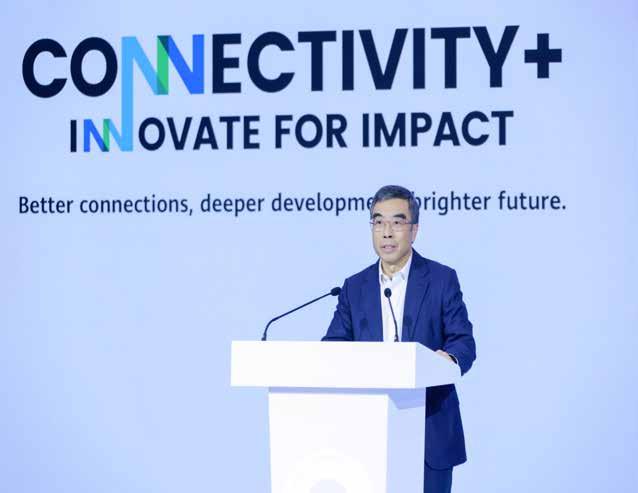

Speakers at the event included senior leaders from the ITU and United Nations, telecom ministers and regulators in Cambodia, Nige ria, Bangladesh, and Pakistan, and business leaders, partners, experts, and customers from China, South Africa, Belgium, and Germany.
"It is clear connectivity alone is not enough. It must be a ordable, the content must be relevant and in the local language, and users must have the skills to make best use of it," said ITU Deputy Secretary-Gen eral Malcolm Johnson. "Thank you to Huawei for their support of the Partner2Connect (P2C) Digital Coalition, and for their announced P2C pledges in the key areas of
rural connectivity and digital skills."
Siddharth Chatterjee, United Nations Resident Coordinator in China, called for "multi-stakeholder partnerships" of policymakers, the private sector, academia, and civil society to close "the sobering reali ty" of a digital divide which exclud ed a third of the global population.
"Our dynamic world urgently needs improved digital cooperation to capitalize on the transformational potential of technology to create new jobs, boost nancial inclusion, close the gender gap, spur a green recovery and redesign our world to be more prosperous and inclusive," he said. "Now is the time to act".
In his keynote address, Dr Liang stressed that access to a stable network was a basic requirement and right in the digital age. For many who remain unconnected, access to reliable connectivity would mark the rst step towards transforming their lives.
"Connectivity will be more than just a tool for convenient communica tions," he said. "Together with digital technologies like cloud and AI, connectivity will help bring everyone into the digital world, and provide them with access to more information and skills, better
Cao Ming, President of Huawei Wireless Solution, said: "As an enterprise with the most com plete ICT capabilities, Huawei integrates the full-technology innovation potential of equip ment, sites, energy, transmis sion, and antennas to address the di culties faced by tradition al site deployment, such as high costs, restricted transportation, lack of power, and maintenance challenges. We have continuous ly upgraded the RuralStar and RuralLink solutions to extend quality coverage to remote areas, enabling more people, commu nity hospitals, schools, local governments, and small- and medium-sized enterprises to enjoy the same high-speed broadband connectivity experi ences as those in cities".
The RuralStar series solutions have provided connections for more than 60 million people in remote areas in more than 70 countries.
The construction of optical broadband networks o ers another important route to realizing a universal service. Huawei has proposed an innova tive AirPON solution for areas with low population density, including remote areas. This solution continuously reduces the footprint of equipment rooms, optical ber installation costs, and network power consumption, while ensuring the rapid deployment of local com munication networks.
In Africa alone, Huawei has laid more than 250,000 kilometers of optical bers, enabling 30 million households to access high-speed broadband. User experience has seen constant improvement. The average speed of home broadband
As ICT infrastructure continues to evolve, innovative technolo gies like cloud and AI are allow ing those in rural and remote areas to enjoy the convenience of a digital world. Huawei Cloud has proposed the Everything as a Service strategy and made Huawei's more than 30 years of technical expertise and digital transformation experience available through cloud services. This means that access to Huawei's digital infrastruc ture capabilities on the cloud is now just as easy, a ordable, and sustainable as water and electricity.
Digital transformation, digital talent, and new business models are all essential for balanced development in remote regions. Huawei previ ously announced that by 2025, with the improved ICT infra structure, the company will work with partners to enable 500 million people to enjoy digital nancial services and 500,000 people to enjoy inclu sive education.
In Cambodia, the ITU's rst P2C partner country, Huawei will work with government depart ments through the Ministry of Posts and Telecommunications and universities to provide 10,000 training opportunities for ICT professionals in the next ve years.
Huawei is committed to inclu sive development. Through its ongoing technological innova tion, Huawei is contributing to a higher level of digitalization in remote regions, enabling every one to enjoy the convenience of a digital life, and promoting the balanced development of the global digital economy.